Human Planet: The Complete Series Blu-ray Movie
HomeHuman Planet: The Complete Series Blu-ray Movie 
BBCBBC | 2011 | 480 min | Not rated | Apr 26, 2011
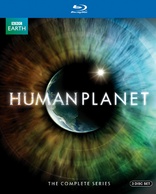
Movie rating
8.4 | / 10 |
Blu-ray rating
| Users | 4.5 | |
| Reviewer | 4.5 | |
| Overall | 4.5 |
Overview
Human Planet: The Complete Series (2011)
Human Planet is an awe-inspiring, jaw-dropping, heart-stopping landmark series that marvels at mankind\'s incredible relationship with nature in the world today.
Starring: Roger MunnsNarrator: John Hurt
Director: Mark Flowers, Nicolas Brown, Tom Hugh-Jones, Tuppence Stone
| Documentary | Uncertain |
| Nature | Uncertain |
Specifications
Video
Video codec: VC-1
Video resolution: 1080i
Aspect ratio: 1.78:1
Original aspect ratio: 1.78:1
Audio
English: DTS-HD Master Audio 5.1
Subtitles
English SDH
Discs
50GB Blu-ray Disc
Three-disc set (3 BDs)
BD-Live
Playback
Region free
Review
Rating summary
| Movie | 4.5 | |
| Video | 4.5 | |
| Audio | 4.5 | |
| Extras | 3.5 | |
| Overall | 4.5 |
Human Planet: The Complete Series Blu-ray Movie Review
Who knew we were so interesting?
Reviewed by Kenneth Brown April 15, 2011Planet Earth, Galápagos, Ganges, Wild China, Nature's Most Amazing Events, Yellowstone, Wild Pacific, Life... the daring cameramen and filmmakers of the BBC Natural History Unit have spent the last five years introducing audiences to the most staggering sights, most spectacular places, most fascinating animals and most remote corners of the globe in breathtaking high definition. But while the NHU has often turned its cameras on the planet's preeminent species -- man -- it's rarely made the diverse peoples of Earth its primary focus. Until now. Human Planet, the latest television series to join the ever-growing BBC Earth family, invites viewers to join a three-year, forty-nation NHU journey to discover the cultures, explore the habitats, unearth the secrets, and hear the compelling stories of one of the most intriguing creatures on the planet.
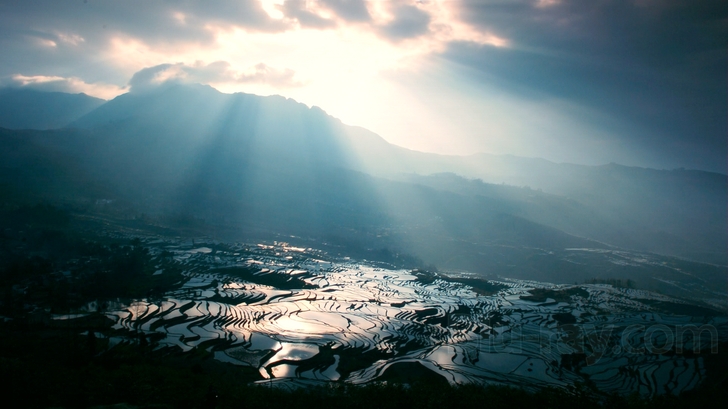
Only one creature has carved a life for itself in every habitat on Earth. That creature is us. All over the world, we still use our ingenuity to survive in the wild places, far from city lights, face to face with raw nature. This is the human planet.
The eight-part, John Hurt-narrated BBC series begins, fittingly, where civilization first flourished: at the edge of the sea. "Oceans: Into the Blue" examines the complex, at-times hostile relationship between man and the ocean, the one habitat on the planet we've yet to tame. Home to three-quarters of all life on Earth, it's a haunting realm of great beauty and even greater danger, and presents those who live near its waters with endless challenges and unique opportunites. In Galicia, at the northwest tip of Spain, a pair of hunters brave increasingly violent tides to collect Goose Barnacles, an expensive European delicacy, from a rocky crevice. In Indonesia, a young upstart named Benjamin, armed with little more than a handmade spear, risks everything to help the men of his village capture and kill a valuable sperm whale. In Laguna, Brazil, fisherman rely on the assistance of eerily intelligent bottlenose dolphins to help them bring in impressive catches. In Hawaii, surfers tackle some of the largest waves on the planet, putting their lives on the line to accomplish the impossible. In Papua New Guinea, a shark caller named Blaze proves his worth as a most literal sorcerer of the seas. And between Borneo and the Philippines, an entire town rises from the waters, Bajau house boaters adapt to aquatic life and hunt beneath the waves, and Filipino compressor divers herd schools of fish into massive nets.
Ironically, Human Planet's second set of stops features some of the driest regions on Earth. "Deserts: Life in the Furnace" strides confidently into the sandstorms of the Sahara, tracks a band of Tubu women traveling across its dunes, joins a Malian cattle herder in a race against wild elephants, goes fishing in the evaporating waters of the Antogo with a crowd of thousands, follows a group of religious men into the bowels of the Earth to dig wells with simple tools and farm life-giving water from a dying desert, and attends a Nigerian fertility dance in which the men primp and perform for the women and the women hold all the power. At each hotspot, "Deserts" delves into the tenuous relationship between humans, Earth's most unforgiving terrain, and its most precious commodity: water. From there, "Arctic: Life in the Deep Freeze" changes directions yet again. Experience Greenland's biting cold as sled-dogging villagers fish for sharks below the ice, embrace the thrill of chasing horned narwhals through an icy sea, and feel the chill of the Great White North as an elderly Inuit snow-mobiler builds an igloo and hurries to gather mussels before the retreating underground tides return. Catch hundreds of flying auks with wide nets atop handheld poles. Watch with baited breath as a team of Norwegians guide a massive herd of reindeer for the duration of an intense migration. And bite your nails as desperate polar bears wander into a town in Manitoba, spurring peace-keeper Bob Windsor to action. If Human Planet is starting to sound like a string of quaint but dazzling adventures in strange alien worlds, that's because that's exactly what every episode is, regardless of whether Borneo, Tunisia or Canada fills the frame.
It's in these first three episodes that Human Planet gains momentum, distinguishes itself from Planet Earth and other BBC nature series, and makes its intentions known. Rather than arrogantly tout the dominance of man, Human Planet approaches homo sapiens much like Galápagos studies the strangest evolutionary anomaly or Wild Pacific analyzes the various creatures strewn across the region's 20,000 islands. And yet the series benefits immensely from the first-hand accounts of the NHU's chosen subjects. Carefully edited interviews, succinct subtitled sequences and revealing personal stories challenge preconceived notions some may hold concerning the... well, nature of a nature documentary series. The NHU's photography is as powerful as ever and its cameras linger on the amazing wildlife and unbelievable locales along the way. That said, if screentime is devoted to an animal or ecosystem, it's because it plays an important role in the greater human story; if the ills of a rapidly expanding industry or the terrors of disastrous deforestation are discussed, it's only to demonstrate how dramatically each manmade catastrophe affects mankind; if a danger or threat is exposed, it's always one that endangers or threatens the oft-overlooked cultures, villages and peoples fighting to stay afloat amid the chaos.
The next three episodes are equally mesmerizing. "Jungles: People of the Trees" turns the series' attention to the planet's rain forests, hunting ten different species of monkey with the highly skilled Matis tribesmen of Brazil, searching for meal-worthy goliath tarantulas with a trio of Venezuelan children, weaving birds-of-paradise feathers into ceremonial garments in Papua New Guinea, scaling towering trees and enduring painful bee stings for honey in the Congo, constructing treehouses high above the jungles of New Guinea, and documenting the existence of reclusive peoples deep within the Brazilian rain forest. "Mountains: Life in Thin Air" provides a rare glimpse into the lives of Mongolian men who train eagles to hunt foxes near the Altai Mountains, Indonesian miners who descend into the depths of the Ijen volcanoes to extract sulfur, experts in the Alps charged with predicting and diverting destructive avalanches, Central Cordilleran bat catchers with a real knack for their trade, selfless Kathmandu surgeons working in mobile clinics across the Himalayas, and high-altitude Buddhist mourners who have no choice but to leave their dead in the open to be disposed of by ravenous vultures. And "Grasslands: The Roots of Power" stalks lions with three intrepid Kenyans, amushes woodland antelope with a young hunter in the South African Kalahari desert, wrangles water snakes with a cheery family in Cambodia, survives an encounter with a sky-blackening flock of Red-billed Quelea in Tanzania, herds horses with a clan of riders on the Mongolian-Manchurian steppe, and takes to the skies with Australian pilots who muster cattle in the Outback using helicopters, four wheelers and a healthy dose of true grit.
By the time "Rivers: Friend and Foe" turns to the source of inland life the world over -- plunging into monsoons along the Mekong Delta, tearing through heavy sheets of ice in Ottawa, preparing for devastating floods in Brazil, and traversing root bridges in India -- Human Planet has made a clear distinction between mankind and its most industrialized civilizations. Needless to say, they aren't remotely similar, a fact made all the more clear in the series' final episode, "Cities: Surviving the Urban Jungle." Humanity has co-existed with nature for eons; industrialized civilization has become nature's enemy. Humanity has learned to draw its strength from the land; industrialized civilization has learned to exert its destructive strength upon the land. Humanity bows when the winds and seas rage; industrialized civilization shakes its fist at the heavens, investing its every effort and resource into taming the untameable. It's in these dualities that Human Planet is at its most relevant and eloquent. Like any good nature documentary series, it explores the weird and wonderful. Unlike most nature documentary series, it speaks to man's ability to subdue the harshest environments and examines the deep, perhaps fatal wounds mankind has inflicted upon itself in recent years. More importantly, it does so without resorting to sermons, despair or fear. Even at its most solemn, Human Planet is a celebration of true ingenuity and the human spirit; a celebration that confidently stands shoulder to shoulder with Planet Earth, Life and other critically acclaimed BBC Earth series.
Human Planet: The Complete Series Blu-ray Movie, Video Quality 
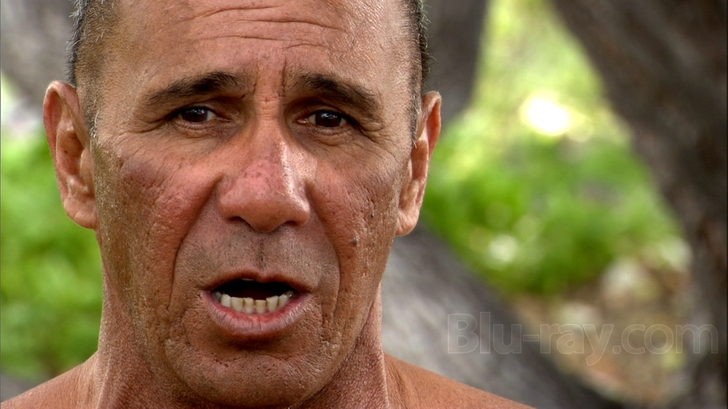
While the terms "1080i" and "VC-1" will no doubt unsettle a small handful of Warner's most obstinate critics, it's important to remember that it's the tangible quality of a video presentation, not the jargon that litters a disc's tech specs, that makes a jaw-dropping high definition image everything it is and more. And Human Planet, dear readers, is a jaw-dropper. From the gorgeous rolling waves in "Oceans" to the fertile canopies in "Jungles" to the iron-wrought earthtones of "Cities," every billowing blue, bountiful green and heavy shadow is striking. With the BBC Natural History Unit turning its cameras on mankind, I'm also pleased to report that skintones are warm, lifelike and oh-so-carefully saturated, revealing the beauty of the many indigenous peoples showcased throughout the series. Detail also leaves a lasting impression. Textures are delicate and refined on the whole, edges are sharp and satisfying (barring a few bouts of minor source-born softness), and little is left to the imagination. Many a stunning closeup reveals the tiniest pores and thinnest hairs. The smallest stones and droplets of water are refined and neatly rendered. And fragile leaves and flakes of rust are given as much attention as the forests and cities they accompany. Moreover, significant artifacting and aberrant noise never invade the image, aliasing and ringing are kept to a bare minimum (and only interfere here and there, primarily in "Jungles"), and nearly negligible banding only appears on the rarest of occasions (even then, it never amounts to an outright distraction and typically only creeps into murky underwater sequences). From beginning to end to every behind-the-lens featurette in between, the Blu-ray edition of Human Planet captures the true majesty of the planet and its foremost residents by way of the NHU's breathtaking photography and Warner's proficient presentation.
Human Planet: The Complete Series Blu-ray Movie, Audio Quality 
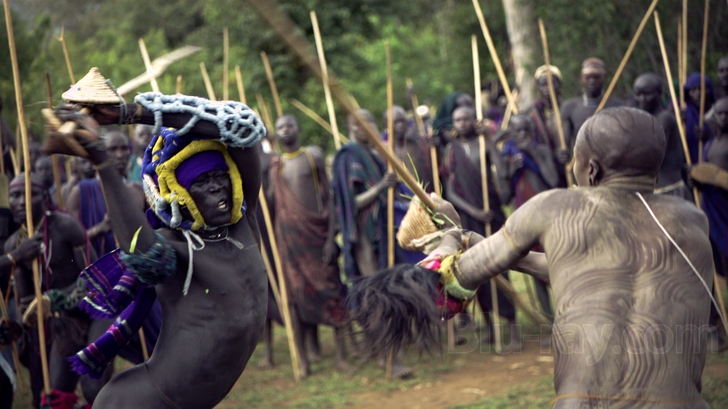
No, Warner's DTS-HD Master Audio 5.1 surround track isn't going to rattle the windows, wake the kids, or rouse the neighbors. Like nearly every documentary series before it, Human Planet is a narration-driven trek across the globe that doesn't deviate from tradition. However, the studio's lossless mix is an exceedingly enveloping experience sure to bring Earth's aural majesty streaming into your home theater. Narrator John Hurt's grandfatherly voice wavers with the soft, well-mannered astonishment of a kindly old man, but remains perfectly clear, smartly grounded and impeccably prioritized throughout the series. But unlike many documentary series, Human Planet immerses the listener in every environment it explores. Oceans surge with power and waves crash all around; ritualistic cries and songs rise above the soundfield and avalanches thunder down mountains; reindeer herds shake the ground and sandstorms overtake every speaker. Through it all, LFE output is strong and steady, rear speaker activity is effective and engaging, and directionality and dynamics will leave audiophiles nodding. Granted, Hurt's voice subdues the most chaotic outbursts, but it's entirely expected and entirely welcome. As it stands, the only shortcomings that made their way into my notes involved source inadequacies, less-than-ideal recording conditions, and the severity of the elements. Otherwise, Human Planet sounds as amazing as it looks.
Human Planet: The Complete Series Blu-ray Movie, Special Features and Extras 
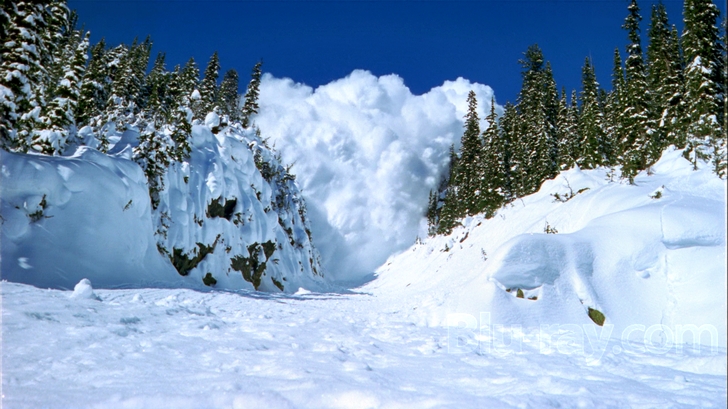
The 3-disc Blu-ray release of Human Planet includes ten behind-the-documentary featurettes, all presented with excellent 1080i/VC-1 encoded video presentations and DTS-HD Master Audio 5.1 surround tracks. And although that only amounts to 100-minutes of bonus material (and a BD-Live portal full of promise), it expounds upon the series and its production quite nicely.
- Behind the Lens (Discs 1-3, HD, 82 minutes): Eight 1080i/VC-1 encoded "Behind the Lens" featurettes make up the bulk of the supplemental content, with one devoted to each episode in the series. Narrated by John Hurt, the ten-minute shorts document the challenges, obstacles and dangers the Human Planet crew encountered during their travels. Just don't look for them in the discs' main menus. Each featurette automatically begins to play at the tail end of its accompanying episode, DTS-HD Master Audio 5.1 surround track and all.
- Fez (Disc 3, HD, 11 minutes): The first of two additional featurettes housed on the third disc focuses on the crew's week-long filming at the Fez Tannery, a messy bit of nauseating business involving pigeon droppings, rotting carcasses, blood, bile, skin-eating lime... just seeing it all is enough to turn your stomach.
- Volcano (Disc 3, HD, 10 minutes): The crew braves the volatile Kawah Ijen Volcano in East Java -- quite literally descending into the jaws of Hell -- to film Indonesian locals mining sulfur from a deadly, gas-filled crater. And while the drama that unfolds centers around camera problems, this secondary featurette is still well worth watching.
- Exclusive Streaming Featurettes (Disc 3): A BD-Live interface on Disc 3 allows Human Planet fans to expand the experience further. Even two weeks before the set's official release date, a bonus featurette, "Zanskar," is already available. The studio has also indicated that other bonus features will be accessible in the near future, making the set's BD-Live Functionality more than a frivolous addition.
Human Planet: The Complete Series Blu-ray Movie, Overall Score and Recommendation 
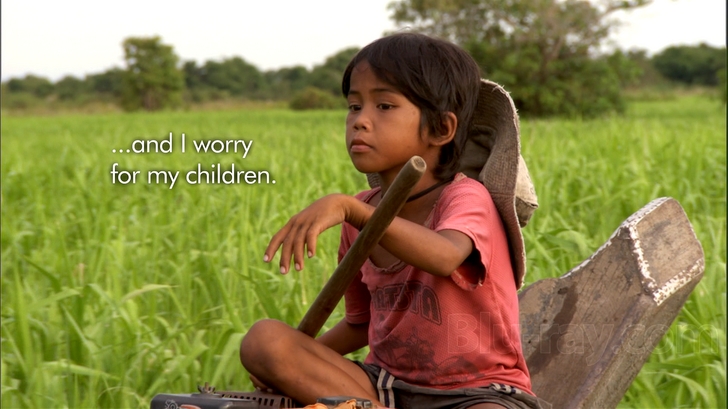
Human Planet tells a very human story. More than seventy very human stories actually, most of which take place in villages and regions where iPods and smart phones would be cast aside in favor of culture, community and shared experience. And by some inexplicable miracle, the series does it all without drifting into preachy waters. Warner's 3-disc Blu-ray release is just as impressive. With a terrific video presentation, an involving DTS-HD Master Audio 5.1 surround track and more than 100-minutes of behind-the-lens featurettes, the Blu-ray edition of Human Planet, like Planet Earth and nearly a dozen BBC-born nature series before it, is worth owning.
Similar titles
Similar titles you might also like

Life
BBC / Narrated by David Attenborough
2009

Wild Pacific
2008

Frozen Planet
The Original UK Series
2011

Nature's Most Amazing Events
2009

Galápagos
2006

Planet Earth
The Complete Series
2006

Madagascar
BBC
2011

Wild China
2008

Africa
2013

Ganges
2007

Planet Earth II 4K
2016

The Blue Planet: Seas of Life
2001

Yellowstone: Battle for Life
2009

The Great Rift
2009

Wonders of the Solar System
2010

Baraka
1992

Hidden Kingdoms
2013

Samsara
2011

HOME
2009

Grand Canyon Adventure: River at Risk 3D
IMAX 3D
2008